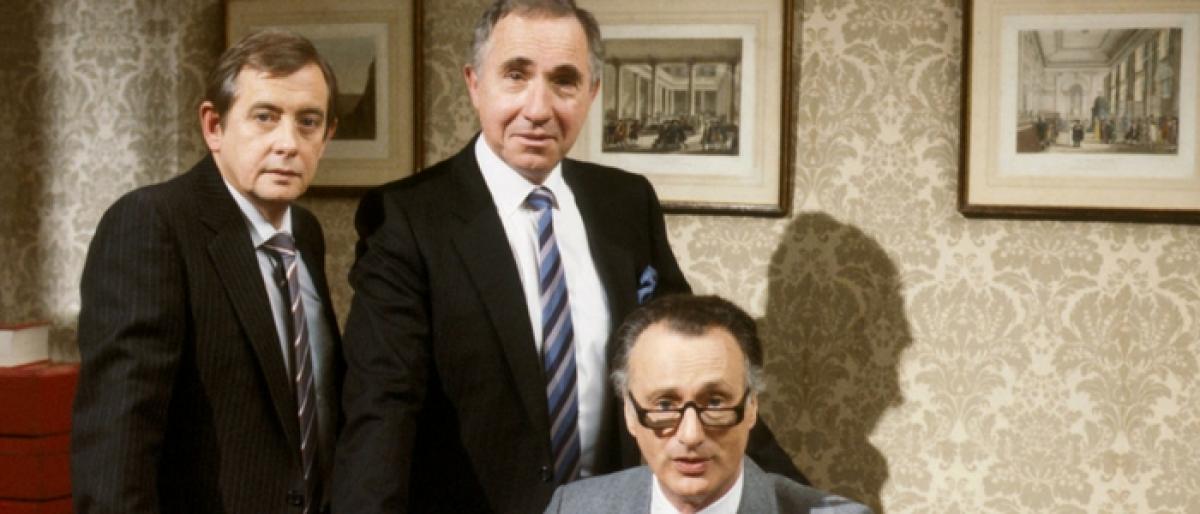Evoking laughter from the corridors of power

Apart from the record of some singular \"inspired\" leaders, who may end up presiding over destinies of millions, including in mature democracies even now (and from a safe distance), humour is not a sentiment evoked by either politics and governance.
Created by Antony Jay and Jonathan Lynn, the saga of Jim Hacker began as a TV series in the 1980s and augmented its popularity and success by subsequently being transformed into books
Apart from the record of some singular "inspired" leaders, who may end up presiding over destinies of millions, including in mature democracies even now (and from a safe distance), humour is not a sentiment evoked by either politics and governance.
But creative minds can even make them a source of hilarity, aided by "the logical and semantic resources of the English language" as this tale of politicians and bureaucrats has proved.
‘Yes, Minister’ chronicles the career of British MP Jim Hacker as he becomes Minister for the (fictional) Administrative Affairs Department after his unidentified party wins the election. The sequel, ‘Yes, Prime Minister’, sees him manoeuvre his way to the top post after the sudden resignation of the incumbent and his domestic and international achievements.
The politics is not so much in Hacker keeping his job or rising up to finally become the Prime Minister, but in his attempts to frame policy or effect other changes in the face of opposition by the Civil Service, particularly represented by his Permanent Secretary (later Cabinet Secretary), Sir Humphrey Appleby.
Hacker's Principal Private Secretary (in both posts) Bernard Woolley, walking a tightrope between his two "masters", a clutch of other officious bureaucrats, devious politicians, wily foreign diplomats, dogged journalists, and so on round up the cast.
Created by the team of English writer and broadcaster Antony Jay and writer and stage and film director Jonathan Lynn, the saga began as a TV series in the 1980s and augmented its popularity and success by subsequently being transformed into books.
Despite its vintage pedigree, it still remains relevant due to the topics it deals with – government secrecy, waste and corruption, collections of citizens' data and privacy concerns, Britain's place in Europe, the role of government in culture or education, the conduct of international relations, public health, and so on. Even terrorism (radical left, not Islamist though) gets a look in, though indirectly.
While the screen version has accomplished performances (facial expressions especially) by Paul Eddington as Hacker, Nigel Hawthorne as Appleby and Derek Fowlds as the lugubrious but pedantic Bernard, the book version, presented as Hacker's diaries, with documents conveying the others' version and more details, has a slight edge as it augments the humour with more wordplay and provides context with the co-authors' annotations and witty comments.
Take for example, Hacker ruminating if Appleby will be surprised if an aircraft carrier turned up in the Central African Republic, and Jay and Lynn tell us that he would very surprised as would be anyone else since the country is a thousand miles inland.
But its main crux – the battle of wills between Hacker, who chiefly defines his success by his re-election and political rise, and Appleby, genuinely convinced that the impartial but elitist civil service is better at identifying "good governance" and the national interest – makes for some spiritedly rib-tickling but ultimately sobering situations – when you realise how decisions that affect us are made.
Language plays a key role – especially Hacker's mixed, or rather mangled, metaphors: "This is a real hot potato. If I don't do anything, it could turn into a banana skin." And Bernard, who spends most time in trying to correct him, responds: "Prime Minister, a hot potato can't become a banana skin... Well if you don't do anything, a hot potato just becomes a cold potato."
One the other hand, there are Appleby's attempts to swamp Hacker or obfuscate matters with his complicated long sentences. "...there is some difficulty in justifiably assigning to it the fourth of the epithets you applied to the statement, inasmuch as the precise correlation between the information you communicated and the facts, insofar as they can be determined and demonstrated, is such as to cause epistemological problems, of sufficient magnitude as to lay upon the logical and semantic resources of the English language a heavier burden than they can reasonably be expected to bear," he tells Hacker.
In simpler words, it is: "You told a lie."
While its most implausible plots (the "drinks room" in a Middle Eastern country) have a real-life basis, its resonance beyond Britain owes to the principal characters – or other such pompous bureaucrat or cynical politician's disregard for the common public despite lip service.
Be it Appleby, who hearing Bernard argue that the citizens of a democracy have a right to know, responds: "No. They have a right to be ignorant. Knowledge only means complicity in guilt; ignorance has a certain dignity", or Hacker's own candid outbursts: "I don't want the truth. I want something I can tell Parliament!" or even Bernard's examples of "irregular verbs", e.g. "I give confidential press briefings; you leak; he's being charged under section 2A of the Official Secrets Act."
And then Hacker's "three articles of Civil Service faith" – that it takes longer to do things quickly, it's more expensive to do them cheaply and it's more democratic to do them in secret – can explain governance anywhere.















